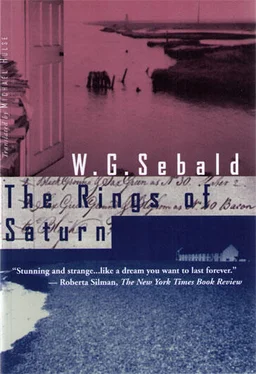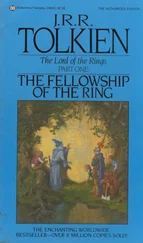W. G. Sebald
The Rings of Saturn
Il faut surtout pardonner à ces âmes malheureuses qui ont élu de faire le pèlerinage à pied, qui côtoient le rivage et regardent sans comprendre l'horreur de la lutte, la joie de vaincre ni le profond désespoir des vaincus.
Joseph Conrad, letter to Marguerite Poradowska, 23rd—25th March 1890
The rings of Saturn consist of ice crystals and probably meteorite particles describing circular orbits around the planet's equator. In all likelihood these are fragments of a former moon that was too close to the planet and was destroyed by its tidal effect (Roche limit).
Brockhaus Encyclopaedia
1. In hospital — Obituary — Odyssey of Thomas Browne's skull — Anatomy lecture — Levitation — Quincunx — Fabled creatures — Urn burial
In August 1992, when the dog days were drawing to an end, I set off to walk the county of Suffolk, in the hope of dispelling the emptiness that takes hold of me whenever I have completed a long stint of work. And in fact my hope was realized, up to a point; for I have seldom felt so carefree as I did then, walking for hours in the day through the thinly populated countryside, which stretches inland from the coast. I wonder now, however, whether there might be something in the old superstition that certain ailments of the spirit and of the body are particularly likely to beset us under the sign of the Dog Star. At all events, in retrospect I became preoccupied not only with the unaccustomed sense of freedom but also with the paralysing horror that had come over me at various times when confronted with the traces of destruction, reaching far back into the past, that were evident even in that remote place. Perhaps it was because of this that, a year to the day after I began my tour, I was taken into hospital in Norwich in a state of almost total immobility. It was then that I began in my thoughts to write these pages. I can remember precisely how, upon being admitted to that room on the eighth floor, I became overwhelmed by the feeling that Suffolk expanses I had walked the previous summer had now shrunk once and for all to a single, blind, insensate spot. Indeed, all that could be seen of the world from my bed was the colourless patch of sky framed in the window.

Several times during the day I felt a desire to assure myself of a reality I feared had vanished forever by looking out of that hospital window, which, for some strange reason, was draped with black netting, and as dusk fell the wish became so strong that, contriving to slip over the edge of the bed to the floor, half on my belly and half sideways, and then to reach the wall on all fours, I dragged myself, despite the pain, up to the window sill. In the tortured posture of a creature that has raised itself erect for the first time I stood leaning against the glass. I could not help thinking of the scene in which poor Gregor Samsa, his little legs trembling, climbs the armchair and looks out of his room, no longer remembering (so Kafka's narrative goes) the sense of liberation that gazing out of the window had formerly given him. And just as Gregor's dimmed eyes failed to recognize the quiet street where he and his family had lived for years, taking Charlottenstraße for a grey wasteland, so I too found the familiar city, extending from the hospital courtyards to the far horizon, an utterly alien place. I could not believe that anything might still be alive in that maze of buildings down there; rather, it was as if I were looking down from a cliff upon a sea of stone or a field of rubble, from which the tenebrous masses of multi-storey carparks rose up like immense boulders. At that twilit hour there were no passers-by to be seen in the immediate vicinity, but for a nurse crossing the cheerless gardens outside the hospital entrance on the way to her night shift. An ambulance with its light flashing was negotiating a number of turns on its way from the city centre to Casualty. I could not hear its siren; at that height I was cocooned in an almost complete and, as it were, artificial silence. All I could hear was the wind sweeping in from the country and buffeting the window; and in between, when the sound subsided, there was the never entirely ceasing murmur in my own ears.
Now that I began to assemble my notes, more than year after my discharge from hospital, I cannot help thinking of Michael Parkinson who was, as I stood watching the city fade into the dying light, still alive in his small house in the Portersfield Road, busy perhaps, preparing a seminar or working on his study of Charles Ramux, which had occupied him for many years. Michael was in his late forties, a bachelor, and, I believe, one of the most innocent people I have ever met. Nothing was ever further from his thoughts than self-interest; nothing troubled him quite so much as the dire responsibility of performing his duties, under increasingly adverse conditions. Above all, he was remarkable for the modesty of his needs, which some considered bordered on eccentricity. At a time when most people have constantly to be shopping in order to survive, Michael seemed to have no such need. Year in, year out, as long as I knew him, he wore either a navy blue or a rust-coloured jacket, and if the cuffs were frayed or the elbows threadbare he would sew on leather trims or patches. He even turned the collars of his shirts himself. In the summer vacations, Michael would make long walking tours of the Valais and the area around Lake Geneva, in connection with his Ramux studies, and sometimes in the Jura or the Cevénnes. It often seemed to me, when he returned from these travels or when I marvelled at the degree of dedication he always brought to his work, that in his own way he had found happiness, in a modest form that is scarcely conceivable nowadays. But then without warning last May Michael, who had not been seen for some days, was found dead in his bed, lying on his side and already quite rigid, his face curiously mottled with red blotches. The inquest concluded that he had died of unknown causes, a verdict to which I added the words, in the deep and dark hours of the night. The shock that went through us at this quite unexpected death affected no one more deeply than Janine Dakyns, who, like Michael, was a lecturer in Romance languages and unmarried too. Indeed, one might say that she was so unable to bear the loss of the ingenuous, almost childlike friendship they had shared, that a few weeks after his death she succumbed to a disease that swiftly consumed her body. Janine, who lived in a lane next to the hospital, had, like Michael, studied at Oxford and over the years had come to a profound understanding of the nineteenth-century French novel that had about it a certain private quality, wholly free of intellectual vanity and was guided by a fascination for obscure detail rather than by the self-evident. Gustave Flaubert was for her by far the finest of writers, and on many occasions she quoted long passages from the thousands of pages of his correspondence, never failing to astound me. Janine had taken an intense personal interest in the scruples which dogged Flaubert's writing, that fear of the false which, she said, sometimes kept him confined to his couch for weeks or months on end in the dread that he would never be able to write another word without compromising himself in the most grievous of ways. moreover, Janine said, he was convinced that everything he had written hitherto consisted solely in a string of the most abysmal errors and lies, the consequences of which were immeasurable. Janine maintained that the source of Flaubert's scruples was to be found in the relentless spread of stupidity which he had observed everywhere, and which he believed had already invaded his own head.
Читать дальше













